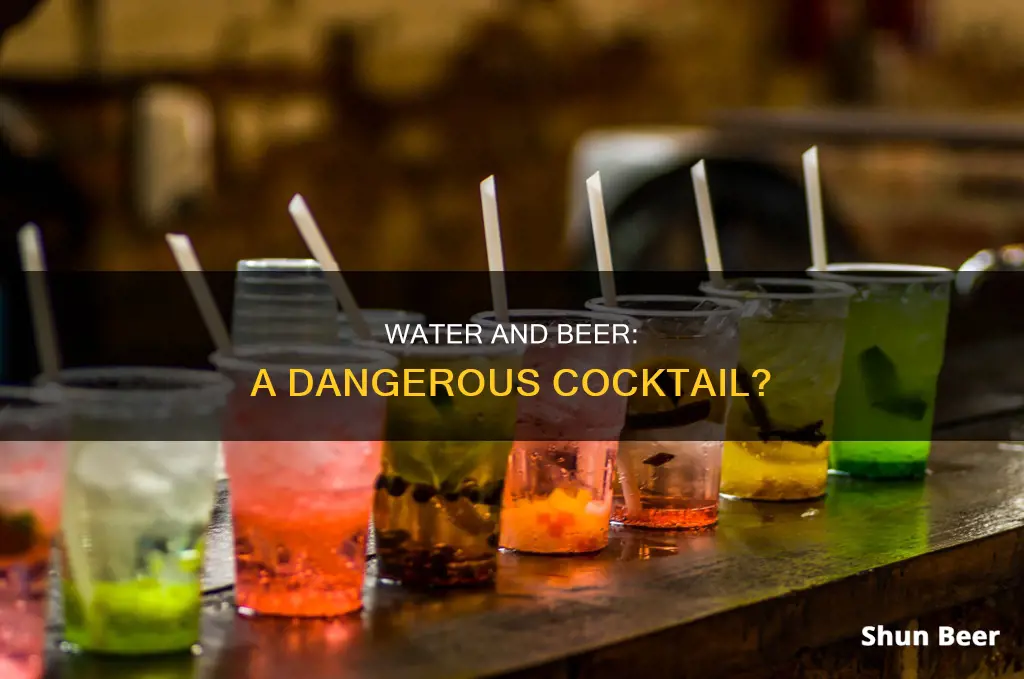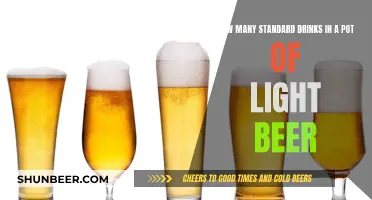
Drinking water does not make you drunker, contrary to popular belief. However, drinking water alongside alcoholic beverages can help prevent dehydration, a common side effect of drinking alcohol. Alcohol is a diuretic, which means it causes the body to remove fluids more quickly, leading to dehydration. Water also helps fill your stomach, causing you to space out your alcoholic drinks and preventing you from becoming intoxicated too quickly. Factors such as changing time zones, being sick, losing weight, ageing, being tired, or drinking on an empty stomach can all contribute to getting drunk faster or requiring smaller amounts of alcohol to do so.
| Characteristics | Values |
|---|---|
| Drinking water with beer | Can help to alleviate symptoms of dehydration caused by drinking alcohol |
| Does not reduce blood alcohol concentration (BAC) | |
| Does not speed up the liver's processes | |
| Dehydration | Caused by alcohol inhibiting the release of an antidiuretic hormone |
| Can lead to symptoms like headaches, dizziness, and fatigue | |
| Can be prevented by drinking water |
What You'll Learn

Drinking water does not reduce blood alcohol concentration (BAC)
Drinking water is a good way to stay hydrated when consuming alcohol, which is important because alcohol is a diuretic and can lead to dehydration. However, it is important to note that drinking water does not directly reduce your blood alcohol concentration (BAC).
When you drink alcohol, it passes through your stomach lining and small intestine into the bloodstream. Alcohol can be absorbed into the bloodstream within minutes, especially if you are drinking on an empty stomach. However, if you drink water or eat while consuming alcohol, it may take longer for the alcohol to be absorbed. This is because food and water slow down the rate at which alcohol is absorbed into the body, giving your liver more time to metabolise it.
While drinking water can help prevent dehydration and may help reduce the effects of a hangover, it does not directly reduce your BAC. The only way to lower your BAC is to give your body time to metabolise the alcohol. On average, your BAC will drop at a rate of 0.015 per hour without any additional alcohol consumed. So, if you have a BAC of 0.10, it will take about 6.5 hours to reach a non-measurable amount of alcohol in your bloodstream.
It is also important to note that drinking water or eating food will not change the way alcohol affects your coordination, reaction time, and decision-making. While you may feel more alert, your body still needs time to process and eliminate the alcohol from your system.
Maryland Beer Laws: Drinking in Your Yard
You may want to see also

Alcohol is a diuretic, increasing urine production
Alcohol is a diuretic, meaning it increases urine production. It causes the body to remove fluids from the blood through the renal system, which includes the kidneys, ureters, and bladder, at a much quicker rate than other liquids.
The diuretic effect of alcohol is influenced by the amount of alcohol consumed and the body's hydration status. The extent of diuresis, or increased urine production, is thought to be directly related to the amount of alcohol consumed. Additionally, the body's hydration status before alcohol consumption affects how much urine is produced.
Research suggests that when the body is already dehydrated, the diuretic effect of alcohol is reduced. This may be due to the body's attempt to restore fluid balance. On the other hand, when the body is well-hydrated, alcohol consumption leads to a greater urine output.
The mechanisms behind alcohol's diuretic effects are not entirely clear, but they are believed to involve the inhibition of vasopressin release. Vasopressin is an antidiuretic hormone that helps the body retain water and regulate urine production. Alcohol increases plasma osmolality, which should stimulate vasopressin release and reduce urine output. However, alcohol also directly inhibits vasopressin release, leading to increased urine production.
In summary, alcohol acts as a diuretic by increasing urine production, and this effect is influenced by the amount of alcohol consumed and the body's hydration status. The mechanisms behind this effect involve the complex interaction of alcohol with the body's hormone regulation systems.
Beer After COVID Shots: What You Need to Know
You may want to see also

Drinking on an empty stomach gets you drunk faster
When alcohol reaches the stomach, up to 20% will be absorbed into the blood. The remaining 75 to 85% is absorbed into the bloodstream in the small intestine. Food prevents alcohol from passing quickly into the small intestine, so when there is food in your stomach before drinking, alcohol is absorbed more slowly.
The longer alcohol stays in the stomach, the slower it is absorbed and the slower it affects the body. Eating before drinking can slow down alcohol's effect on you and reduce your chances of a bad reaction to alcohol.
Drinking on an empty stomach can be dangerous. An inability to think clearly or move your body safely can lead to serious harm, injury, or even death in extreme cases. It can also increase your risk of a hangover, with symptoms including dizziness, inability to concentrate or think clearly, mood issues, and sensitivity to light and sound.
To avoid the ill effects of drinking on an empty stomach, it is best to eat at least an hour before drinking. If you plan on consuming more than one drink, choose a lower-alcohol beverage, cut it with water or other non-alcoholic liquids, and sip it slowly over a long period. Drink water at the same time to stay hydrated, as alcohol is a diuretic and causes your body to remove fluids from your blood through your renal system.
Beer and Motrin: Safe Mix or Health Risk?
You may want to see also

Dehydration increases BAC
Alcohol is a diuretic, which means it causes the body to remove fluids from the blood through the renal system, including the kidneys, ureters, and bladder, at a much quicker rate than other liquids. If you don't drink enough water with alcohol, dehydration can occur quickly.
When you drink alcohol, it passes through your stomach lining and small intestine into the bloodstream. Drinking on an empty stomach means alcohol can be absorbed into the bloodstream within minutes, but drinking water or eating while consuming alcohol can slow this process down. Once in the bloodstream, alcohol can travel anywhere in the body, including the brain, which is why judgement is impaired when drunk.
The body's metabolism can turn some components of alcohol into nutrients and energy at a rate of about one beer, a small glass of wine, or one shot of liquor per hour. However, when processed by enzymes in the liver, alcohol is converted into acetaldehyde, which can become toxic in high doses. The liver then has to turn this into acetate to be removed from the body.
Alcohol also reduces the amount of vasopressin, an antidiuretic hormone, that the body makes. Vasopressin causes the body to retain water, limiting urine production. By suppressing this hormone, alcohol exacerbates the diuretic effect, leading to dehydration.
Water is flushed out of the body much faster than alcohol is processed. This can significantly increase BAC if the body's water supply is not replenished. If more alcohol is consumed while the body is still processing previous drinks, BAC can rise quickly.
Drinking water while consuming alcohol is important to prevent dehydration and to support the organs, such as the liver and kidneys, in processing the alcohol.
Christians and Beer: Is Drinking Allowed?
You may want to see also

Alcohol affects people differently
Biologically, age, metabolism, body composition, and medical conditions can influence alcohol tolerance. For instance, individuals over 25 years old may find that they cannot consume the same quantity of alcohol as they did in their younger years. Additionally, factors such as jet lag, dehydration, and lack of sleep can lower alcohol tolerance and enhance intoxication.
The environment and social context in which alcohol is consumed also play a significant role. Drinking alcohol in a rowdy bar with friends or at a football game can lead to faster and more excessive consumption compared to sipping wine alone at home. The atmosphere, the company kept, and the expectations of the social situation all contribute to the perceived effects of alcohol on the body.
Psychologically, our expectations and perceptions strongly influence how alcohol affects us. People often associate certain alcohols with particular moods or behaviours, such as feeling social or tired. However, psychologists suggest that these reactions are more influenced by our mindset and the company we keep rather than the alcohol itself. A study from Cardiff University found that individuals base their level of intoxication on those around them, rather than their actual intoxication level.
Furthermore, the consumption method, speed, and choice of mixers can also impact the effects of alcohol. Drinking alcohol slowly over time will have a different impact compared to consuming multiple shots in a short period. Additionally, mixing alcohol with caffeinated beverages or diet drinks can mask the effects of intoxication, leading to increased consumption.
While ethanol is the standard intoxicating ingredient across all alcoholic beverages, factors such as ABV (alcohol by volume) result in varying alcohol content per fluid ounce. For example, light beers typically have a lower ABV of 3-5%, while wines may range from 12-15%, and spirits like whiskey can reach up to 40% ABV. As a result, consuming the same volume of different alcoholic beverages can lead to significantly different levels of intoxication.
Beer Intolerance: Why Some People Can't Drink It
You may want to see also
Frequently asked questions
No, drinking water does not make you drunker. However, drinking water can help prevent dehydration, which is a common side effect of drinking alcohol. Water can also help to fill your stomach and slow down your alcohol consumption.
Water does not speed up or slow down the effects of alcohol. Drinking water can, however, help to prevent you from becoming intoxicated by spacing out your alcoholic drinks.
There are several factors that can cause you to get drunk faster or increase your blood alcohol concentration (BAC). These include changing time zones, being sick, losing weight, ageing, being tired, or drinking on an empty stomach.
Most experts recommend drinking a glass of water between each alcoholic drink to slow down your alcohol consumption. It is important to drink water at a normal and reasonable pace, as chugging water can cause bloating or nausea.
Drinking water before and after consuming alcohol can help prevent dehydration, which is a common cause of hangovers. If you are vomiting due to a hangover, drinking water can help to rehydrate your body.







